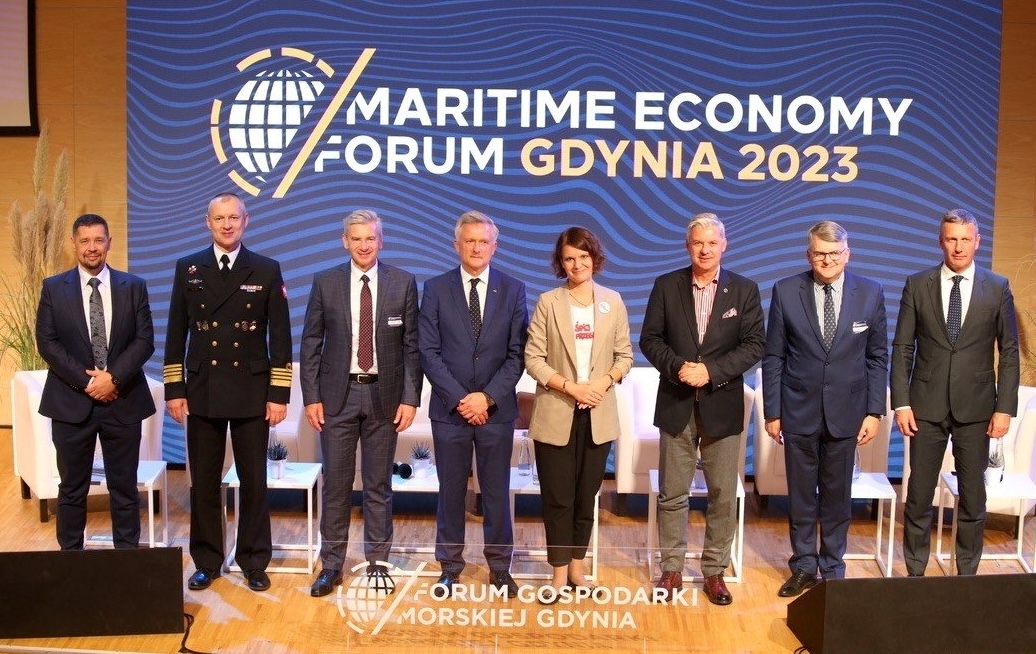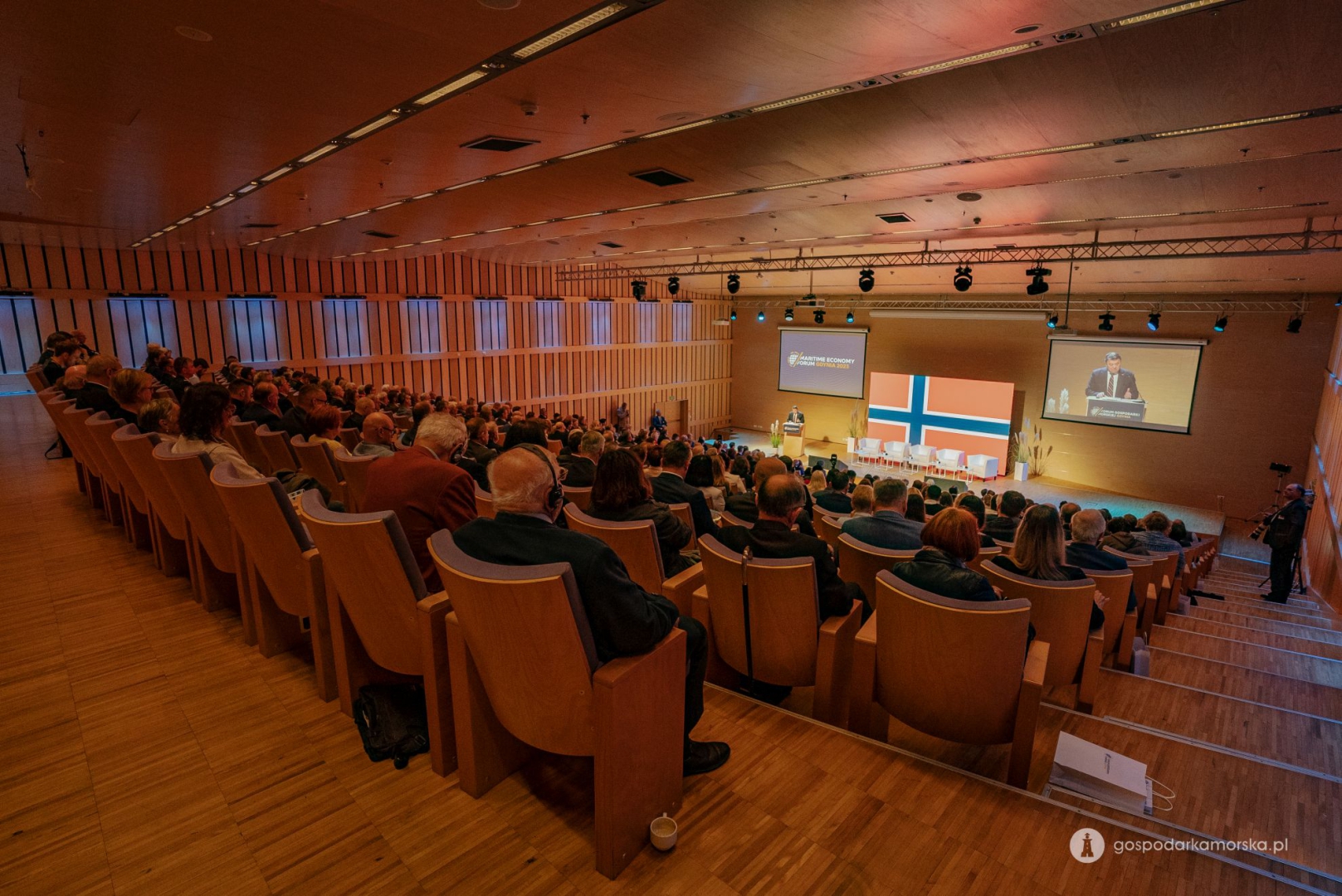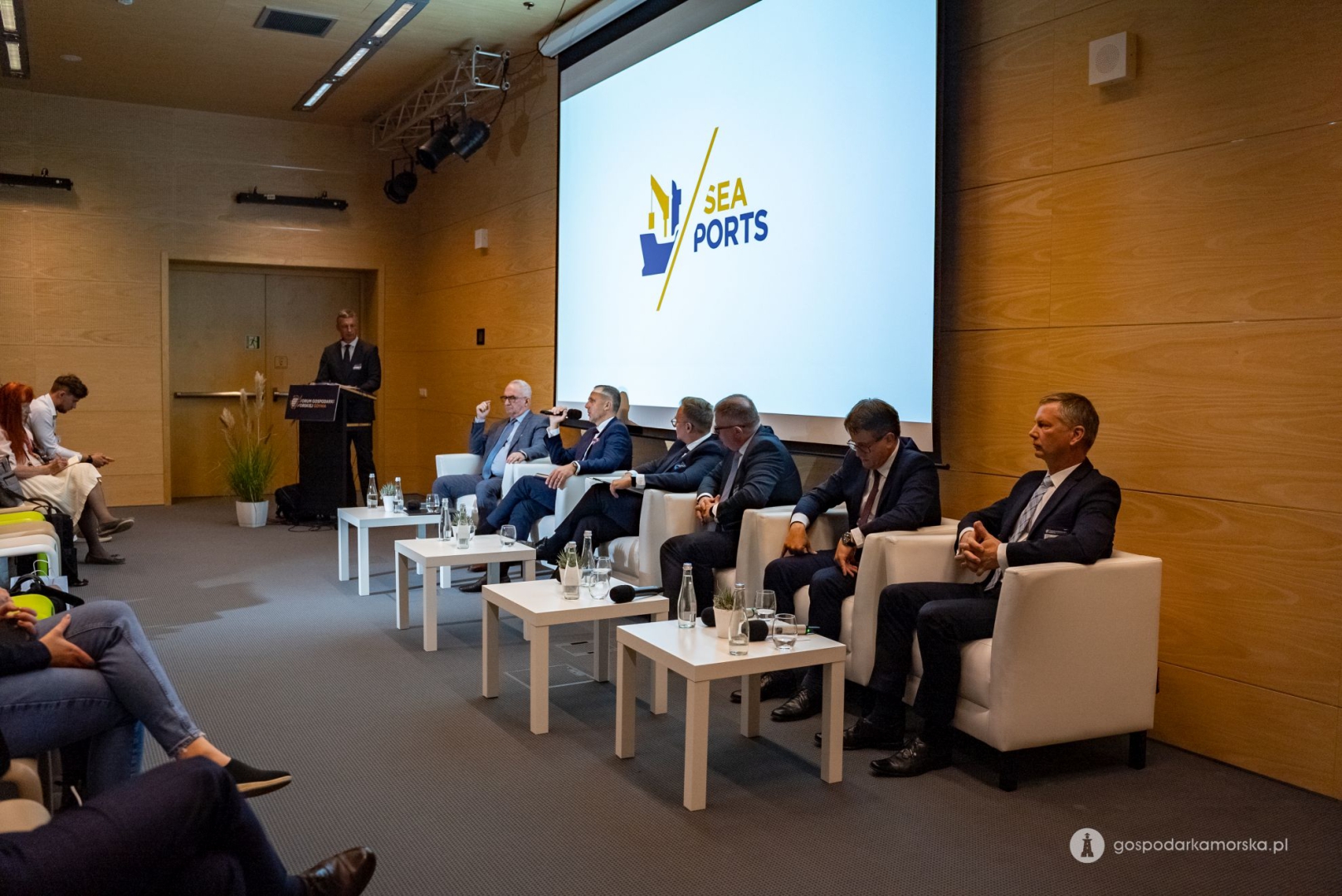
Last Friday, representatives of the maritime economy sector gathered in Gdynia for the 22nd time to discuss the industry's problems and opportunities.
This year's Gdynia 2023 Maritime
Economy Forum closed not only the entire week of industry meetings
and talks in the Tricity - after all, the Baltexpo fair had ended
only the day before - but also the hot, pre-election conference
season.
The Forum was traditionally started by its leader, Sławomir Kalicki, and the vice-president of Gdynia, Katarzyna Gruszecka-Spychała.
– First of all, we want to take a
broad perspective on our geopolitical environment and the resulting
consequences for the maritime economy. There is so much going on that
we want to focus on the threats, but also on the opportunities. We
will talk, for example, about cybersecurity, which is only now
reaching awareness. This is a real threat that could cause a blockage
of the entire supply chain. We will also show the British National
Shipbuilding Program, which was introduced a few years ago in Great
Britain, showing a 30-year perspective for the shipbuilding industry
– announced MEFG leader Sławomir Kalicki.
Vice-President of Gdynia Katarzyna
Gruszecka-Spychała emphasized the importance of maritime economy and
the Forum for Gdynia itself.
– The broadly understood maritime economy has indeed been developing dynamically recently. We have to react to these changes, and sometimes it may even be worth anticipating them and being well prepared for them in order to achieve the economic effect that interests entrepreneurs. However, I think that a very important issue is also the fact that this is a world that brings us exceptionally big changes. Recent geopolitical events mean that the focus on this variability is greater than in recent years - said the Vice-President, emphasizing the high attendance at the Forum.
The first point of the program were
speeches by the honorary guests - the ambassador of the United
Kingdom of Great Britain and Northern Ireland in Poland Anna Clunes,
the ambassador of the Kingdom of Norway in Poland Øystein Bø and
Admiral Rex Cox, director general of the National Shipbuilding Office
in Great Britain. They all focused on fundamental similarities
between markets, common challenges and options for collaboration.
This part ended with a speech by the President of the Port of Gdynia
Authority, Jacek Sadaj, who briefly presented the investments being
implemented and already completed in the port, including: digital
twin, Droga Czerwona (Red Road, the planned arterie to port grounds)
or Outer Port.
The substantive part began with two interesting presentations. First, Małgorzata Bonikowska, president of the Center for International Relations of the University of Warsaw, allowed the audience to look at the Baltic Sea from a geopolitical perspective, after NATO enlargement. Then, Piotr Czarnecki, presented in the agenda as a "business practitioner, leader in banking, telecommunications and digital business", argued based on data from European and national institutions why the economic situation in Poland, contrary to official announcements, is not as good as it might be. His presentation was received with an ovation by the audience, who seemed to share his point of view.
Then, all previous speakers sat on
stage to answer questions from the audience. There were plenty of
them, and the whole discussion was even longer.

After the break, thematic panels started, which took place in various rooms of the Science and Technology Park at the same time, as well as the seminar "Cybersecurity in the maritime sector – challenges and threats in 2023", conducted at the same time by Rafał Cichocki, head of the Maritime Cybersecurity Center at the Maritime University in Gdynia. Adam Danieluk - President of ISSA Poland, Cybersecurity specialist, manager, information security expert, Krzysztof Binkowski - computer forensics expert, authorized Microsoft trainer, EC-COUNCIL, academic lecturer, Piotr Chmielewski - cybersecurity specialist at the Port of Gdańsk Authority, Piotr Tretyn - head of the IT and Telecommunications Department at the Port of Gdynia Authority, Dariusz Dąbrowski - Head of Department, Digital Solutions DNV, Izabella Łapko – Leading Auditor in NASK SA talked about the attempts and possibilities of facing one of the biggest contemporary threats and how to look at cybersecurity in maritime industry companies.
During the panel devoted to the
shipbuilding industry invited guests and experts talked among others
about „Miecznik” programme and plans of rearmamenting of Polish
Navy. The panelists were: Admiral Rex Cox (CEO of the UK National
Shipbuilding Office), Phil Craig (Managing Director for International
Shipbuilding in Babcock), Cmdr Artur Kołaczyński (Chief of Staff of
COM- DKM), Cmdr Lt. Dawid Domański (Armament Agency - Maritime
Technology Command), Marcin Ratajczyk (Naval Services Manager, Thales
Poland) and Andrzej Wojtkiewicz (PGZ SW Representative, Sales
Director, Deputy Director of the "Miecznik" program). The
panel was led by Commander Dr. Hab. Bartłomiej Pączek.
In another room at that time,
experts were talking about maritime logistics. The leader of the
panel was Marek Tarczyński, President of the Polish International
Freight Forwarders Association (PIFFA), President of the Management
Board of Terramar Sp. z o.o., and the moderator was prof. Andrzej
Grzelakowski. The current state of the sector was assessed by Marta
Waldmann (Łukasiewicz Research Network - Poznań Institute of
Technology), Maciej Bąk (Vice-President of Port of Gdynia
Authority), Krzysztof Laskowski (Vice-President of the Management
Board, Morska Agencja Gdynia Sp. z o.o.), Małgorzata Musińska-Kubis
(Transport and Logistics Manager, Ciech S.A.), Alina Angielczyk
(Member of the Management Board of Hapag-Lloyd Poland, Sales Director
Area North Hapag-Lloyd AG), Adam Żołnowski (Member of the
Management Board, Chief Financial Officer, Baltic Hub Container
Terminal Sp. z o. o.), Bohdan Kozaczuk (Deputy Director of the Board
of Directors of COSCO Shipping Lines Poland).
Andrzej Popadiuk, who hosted the
entire main part of Maritime Economy Forum, was also the moderator of
the panel. His conversation was about renewable energy. Jakub
Budzyński (Polish Offshore Wind Energy Society Representative),
Grzegorz Chodkowski (Vice President Offshore Development Poland, RWE
Renewables), PhD Tomasz Kalinowski (Professor in Applied Science
Academy in Sopot), Kacper Kostrzewa (Project Director of BC-Wind),
Paweł Mawduk (Offshore Wind - Supply Chain Project Manager,
Polenergia), Agata Staniewska-Bolesta (Managing Director Offshore
Poland, Ørsted Poland), prof. Adam Weintrit (Rector of the Maritime
University of Gdynia) and Marcin Wiśniewski (Regulation and Permit
Director Equinor in Poland) sought answers to questions about the
opportunities for the development of offshore wind energy in the
Baltic Sea and whether Poland can be a significant producer of green
energy.
Tomasz Chamera, President of the
Polish Yachting Association, Vice-President of World Sailing, was
traditionally the host of the panel devoted to business in sailing,
during which the interlocutors spoke, among others: about challenges
related to economic and geopolitical changes, but also about
technological innovations. The panel participants were Łukasz Szyca
- Vice President of Polboat, Sales Director of Marineworks, Artur
Połoczański - Public Relations Director of Sunreef Yachts, Monika
Bakkal - Marketing Director of Galeon Yachts, Bogusław Witkowski -
Vice-President of the Pomeranian Regional Sailing Association, Jakub
Płażyński - Director of the Shareholder Cooperation Office of Bank
Pekao SA.
Controversial right of pre-emption
In
the next room, there was a panel devoted to sea ports, hosted by
Piotr Pawłowski, Chairman of the Council of Stakeholders of the Port
of Gdynia. To talk about the development of ports in the light of new
legal regulations, he invited Rafał Czyżyk, a specialist in
maritime law from CMW Legal, Marek Klabacha, a representative of the
Rhenus Group, Jan Jarmakowski - president of the Management Board of
Gdynia Container Terminal, as well as presidents of the ports of
Gdańsk, Gdynia and Szczecin-Świnoujście - Łukasz Malinowski,
Jacek Sadaj and Krzysztof Urbaś, respectively.

The discussion began with a
conversation about the Polish Port Act of 1996, which everyone
gathered considered very successful. This document introduced, among
others: the need to separate port management from transhipments, thus
prohibiting port authorities from conducting effective transhipment
operations. However, later changes undermined this principle.
Ultimately, the 2004 amendment ordered management boards to get rid
of shares in operator companies, but in 2014 the EU port regulation -
described by attorney Rafał Czyżyk as a "legal monster" -
diluted this rule. Finally, port authorities currently own these
types of assets.
However, having established that
all the discussants agreed on the advisability of separating port
management from transshipment, Piotr Pawłowski inquired why the
management boards had still not sold their shares in the operator
companies, despite attempts that had been going on for years. Łukasz
Malinowski from the Port of Gdańsk Authority, which holds shares in
Port Gdański Eksploatacja, admitted that the management board "looks
at this entity as one that should not ultimately be in our group."
Jacek Sadaj, speaking about the Port of Gdynia's shares in the Baltic
Bulk Base, described that the port made efforts to sell its 50% of
BBM.
– The company was valued, the
offer was tried to be sold, but to no avail – he said. He added
that this was probably influenced by the specific business, economic
and geopolitical situation.
Krzysztof Urbaś, when asked about
what he did as the president of the Szczecin-Świnoujście Seaports
Authority to support investors, returned to the previous thread and
said that he was far from saying that ports are not allowed to
perform reloading activities.
– It is known that management
employees themselves would not do this, today's management employees
are not necessarily port workers. But if the management board had not
sold the shares in the operating companies, it could have
commissioned the reloading to specialists, and there was nothing
stopping it – he argued.
However, Marek Klabacha, President of the Management Board of Rhenus Polska, which purchased approximately 40% of shares in Bulk Cargo Port Szczecin, could also talk about the transaction that Piotr Pawłowski asked about.
– The purchase process was
carried out freely, we competed with organizations that directly or
indirectly belong to the government – said Klabacha. When asked
whether the Szczecin-Świnoujście Seaports Authority had done
anything to encourage or enable the transaction, he replied that in
his opinion the port authority's main purpose was not to interfere.
However, he added that the described transaction is a special case
because it occurred at a special moment. He also asked to speed up
certain work in the management offices. Krzysztof Urbaś replied that
the administrative proceedings were still ongoing and everything is
by the book.
Jan Jarmakowski from GCT talked about
the comfort of a perpetual land lease agreement.
– We have perpetual usufruct, which gave us the comfort to invest large amounts of funds in the Port of Gdynia – said Jarmakowski. He confirmed the earlier words of Łukasz Malinowski from the Port of Gdańsk that not all regulations are favorable to investment decisions, because the duration of the concession is limited to 30 years. – As a result, we are in a losing position compared to other EU countries where these deadlines are longer. We invested in Gdynia because we felt comfortable with the long-term perspective thanks to perpetual usufruct.
Jarmakowski also said that GCT has
not paid any dividends so far. All earned funds were reinvested in
infrastructure. He also referred to the recent amendment to the Port
Act and the issue of the possibility of pre-emption of port areas by
a company designated by the Council of Ministers.
– The mechanism gives the state
treasury and administration very broad powers regarding the market
valuation of assets. If the minister does not agree with the
valuation of shares concluded by two contracting entities, he may
take it to court and then the valuation will be made by a court
expert – he said. He used an example from his own experience. –
The case dragged on for 6 years: the court expert valued our land
based on the land of the Rumia commune. Have you seen a port anywhere
in Rumia? The parties do not reach an agreement in this way, and the
state treasury, through the company indicated by the Council of
Ministers, has the right to develop the land under the right of
pre-emption. If we do not want to discourage private capital from
investing in ports, we should change these regulations, giving the
state control over who wants to invest.
Attorney Czyżyk also reacted
negatively to the amendment. He stated that doing business in ports
is currently over-regulated.
– The effect of the right of
pre-emption is that Szczecin notaries require a declaration that the
company being sold does not own any real estate or is not a tenant in
the port area. Therefore, if someone rents an office for a period
exceeding 10 years, they are subject to the right of pre-emption - he
pointed out. He added that one of the worst aspects of this mechanism
is the fact that "the buyer under pre-emption can take over the
assets at a price he deems appropriate, start using them, and in the
meantime, litigate for valuation for years."
Piotr Pawłowski described that the
councils of port stakeholders sent requests to parliamentarians to
suspend the amendment proceedings in order to conduct public
consultations, but without any response. The same was true of the
petition to the president to postpone the signing of the amendment,
which also went unnoticed. Appeals from business circles to
politicians have met with no response. Pawłowski also asked Łukasz
Malinowski why the Port of Gdańsk failed to sign an agreement
regarding the so-called Europort despite submitting a binding offer.
The President of the Port of Gdańsk replied that he was not in the
Port of Gdańsk Authority at that time.
In turn, Jacek Sadaj from the Port of Gdynia was asked about what types of determinants the Port of Gdynia Authority will take into account when selecting an operator in the Outer Port, taking into account the amendment on the right of pre-emption and whether the port will be able to accept offers if they come from "unfriendly" countries. ". Sadaj replied that four partners had signed up to participate in the talks. He added that geopolitical issues will be taken into account, but the final decision is made not by the Port of Gdynia Authority, but by the competent minister.
However, the panel participants
agreed that changes to existing regulations should include extending
the license period from 30 years. The President of the Port of
Gdańsk, Łukasz Malinowski, revealed that this topic had already
been raised in talks with the ministry.


